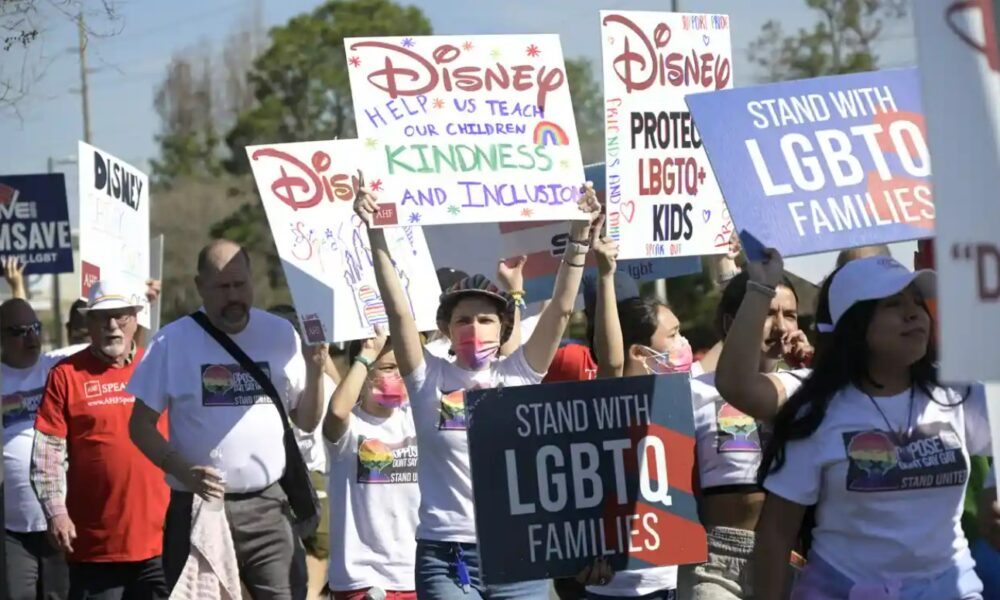Considering that Disney owns a theme park that they call the “happiest place on Earth,” it is disappointing that the company currently supports several legislators who want to silence 2SLGBTQIA+ people and make Florida the most heterosexual place on Earth. Disney made headlines after the Orlando Sentinel and other news outlets exposed the company’s financial donations of over $253,850 USD to Florida legislators who voted to pass the Parental Rights in Education bill, better known as the “Don’t Say Gay” bill. Passed by the Florida Senate on March 8, the bill prohibits any discussion of sexual orientation or gender identity in schools. While he has not yet signed it into law, Florida governor Ron DeSantis has spoken in favour of the bill and is expected to approve it soon. The law aims to prevent “exposing” children to 2SLGBTQIA+ culture and topics, effectively censoring queer and gender nonconforming young people growing up in Florida. What these lawmakers don’t realize is that 2SLGBTQIA+ culture goes beyond sex; these children will never be able to see school as a safe place for them, which will negatively impact their mental health and even their livelihoods.
By funding these legislators, Disney goes against their publicly proclaimed company values to create a more inclusive world. For instance, during Pride month, Disney splurged on rainbow merchandise and virtue-signalled through supportive tweets. While Disney supposedly aims to spread magic and acceptance, Disney Pride is a rainbow-washed marketing ploy. Following the company’s hypocritical behaviour, the 2SLGBTQIA+ community—which many of Disney’s staff and are a part of—decided to stand up for themselves, sparking walkouts primarily amongst Disney World workers in Florida.
In response to criticism, Disney CEO Bob Chapek paused financial support to the homophobic legislators and pledged to instead donate $5 million USD to the Human Rights Campaign (HRC). While this pledge is financially beneficial to the HRC, throwing money at 2SLGBTQIA+ organizations does not erase the harm that Disney’s previous support to Florida legislators has already caused. The fact that Chapek only ceased funding after receiving major backlash shows that his public remorse is a matter of protecting his and the company’s public image. Chapek doesn’t seem to understand that his actions demonstrate a greater commitment to combating cancel culture than to fighting political injustices. The HRC did not trust his intentions either—they publicly refused the donation, stating that Disney needs to focus on getting oppressive bills vetoed rather than performatively speaking out against them.
In a tweet shared on Good Morning America, Chapek wrote, “The biggest impact we can have in creating a more inclusive world is through the inspiring content we produce, the welcoming culture we create here and the diverse community organizations we support, including those representing the LGBTQ+ community.”
The problem with this statement is that it absolves Disney of the responsibility to use its power to protect, rather than harm, the communities they claim to support. As a company, Disney’s financial power gives them a huge influence over politics—and in this case, they used that power to actively contribute to a less inclusive world. Stopping payments and pledging allyship means nothing when Disney’s support has already pushed the “Don’t Say Gay” bill closer to becoming policy.
As one of the largest entertainment companies in the world with a massive influence on children, Disney needs to actively stand against harmful legislation. Supporting these bills, let alone staying silent, harms their 2SLGBTQIA+ fans and employees. While company values can change—former Disney CEO Bob Iger previously threatened to boycott filming in the state of Georgia amid anti-LGBTQ+ bills in 2016—it is Chapek’s responsibility to ensure that future value changes are progressive and genuine. Performative action has no place in a world where the safety of marginalized groups is threatened. Disney thrives on internal and external support from queer people; it is antithetical for them to profit from and harm marginalized communities at the same time.








